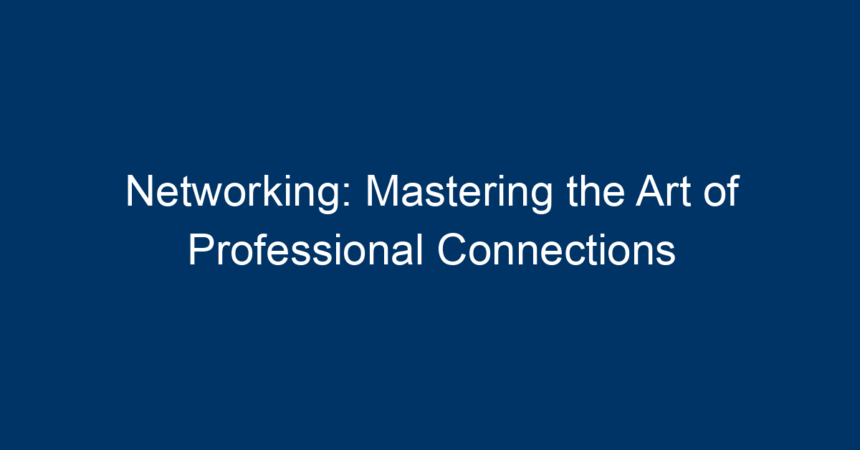In today’s fast-paced world, mastering the art of networking is essential for anyone looking to advance their career, start a business, or forge meaningful professional relationships. Networking isn’t just about exchanging business cards at events; it’s a vital skill that can lead to new opportunities, insights, and partnerships. This article explores the nuances of networking, providing actionable tips to help you build authentic connections that last.
The Importance of Networking
Building Relationships
Networking allows professionals to build relationships that can provide mutual benefits. Whether you are seeking a mentor, looking for collaborators, or trying to expand your client base, effective networking can lead to significant opportunities. According to a survey conducted by LinkedIn, 85% of jobs are filled through networking. This statistic underlines the critical role that networking plays in career advancement.
Skill Development
Engaging with diverse professionals exposes you to new ideas and different perspectives. This interaction not only broadens your knowledge but also helps you develop essential skills, such as communication, negotiation, and conflict resolution. Networking encourages personal growth, pushing you out of your comfort zone and fostering adaptability.
Enhancing Visibility
Active networking can significantly enhance your visibility in your industry. Attending events, participating in discussions, and contributing to online forums can help you establish a personal brand that resonates with your target audience. The more visible you are, the more you’ll be remembered when opportunities arise.
Effective Networking Strategies
1. Define Your Networking Goals
Before diving into networking, it’s crucial to define your goals. Are you looking to find a mentor, expand your business, or perhaps learn about a new industry? By clarifying your objectives, you can tailor your networking efforts to achieve the desired outcomes.
2. Choose the Right Platforms
Networking opportunities abound in various formats, from industry conferences to social media platforms like LinkedIn and Twitter. Here’s how to choose:
-
In-Person Networking: Attend relevant industry events, seminars, and workshops. These face-to-face encounters allow for deeper connections.
-
Online Networking: Join professional groups on platforms like LinkedIn and Facebook. Participate in discussions and share valuable content.
- Informational Interviews: Reach out to professionals in your field for coffee chats or virtual meetings to learn from their experiences.
3. Master the Elevator Pitch
An elevator pitch is a brief introduction that highlights who you are, what you do, and what you bring to the table. Keep it concise (around 30 seconds) and focus on making a memorable impression. Here’s a structure to follow:
- Your Name and Profession: Start with a warm introduction.
- Value Proposition: Briefly mention your strengths or unique skills.
- Call to Action: Conclude with a question or an invitation to connect further.
4. Cultivate Authenticity
Be Genuine
Authenticity is key when building connections. People can sense when someone is being insincere. Share your stories, challenges, and achievements genuinely. This authenticity fosters trust and encourages others to engage with you on a deeper level.
Give Before You Receive
Networking isn’t just about what you can take; it’s equally about what you can offer. Be generous with your knowledge, insights, and time. Helping others can lead them to reciprocate, creating a win-win situation.
5. Follow-Up and Maintain Connections
After meeting someone, make sure to follow up within 24-48 hours. A short message thanking them for their time and expressing your interest in staying in touch can go a long way. Utilize tools like:
- Email: Personalize your follow-up with a reference to your conversation.
- Social Media: Connect on LinkedIn or follow on Twitter to keep the conversation going.
- Networking Platforms: Use tools like Meetup or Eventbrite for future interactions.
Networking Etiquette
Understanding the dos and don’ts of networking can significantly enhance your effectiveness. Here are some essential tips to follow:
Do:
- Be Respectful: Be mindful of others’ time and be courteous in conversations.
- Listen Actively: Show genuine interest in others by asking questions and listening attentively.
- Dress Appropriately: First impressions matter; dress smartly according to the event’s context.
Don’t:
- Be Pushy: Avoid pressuring someone for favors or connections. Build rapport first.
- Dominate Conversations: Share the spotlight; networking is a two-way street.
- Neglect to Follow-Up: A lack of follow-up can signal disinterest.
Leveraging Online Networking Tools
In the digital age, networking has transformed significantly. Here are some online tools to enhance your networking strategy:
1. LinkedIn
As the leading professional networking site, LinkedIn allows you to connect with industry leaders, join professional groups, and publish articles. Use its features to interact with content, endorse skills, and request recommendations.
2. Professional Groups
Explore platforms like Meetup or Eventbrite to find local networking events, webinars, and workshops. Joining industry-specific forums can also provide opportunities for discussions and collaborations.
3. Social Media
Utilize platforms like Twitter and Instagram to connect with thought leaders in your industry. Engaging in conversations via hashtags can help you broaden your professional circle.
Actionable Insights to Enhance Your Networking Skills
- Attend Networking Events Regularly: Regular participation keeps you in the loop and helps you meet new people.
- Practice Active Listening: Focus on what others are saying rather than planning your response.
- Set a Networking Challenge: Aim to meet a certain number of new contacts each month and track your progress.
- Follow Industry Trends: Staying updated on industry changes can make for engaging conversation starters.
- Document Connections: Maintain a networking journal to track your interactions and follow-up actions.
Conclusion
Mastering the art of networking is not just about building a list of business contacts; it’s about creating meaningful relationships that can support your career and personal development. By defining your goals, choosing the right platforms, and embracing authenticity in your interactions, you can build a robust professional network that stands the test of time.
Remember, effective networking is a continuous journey. Each connection has the potential to lead to new opportunities, insights, and partnerships. So, take action today—step out, connect, and watch your professional world expand through the art of networking!




